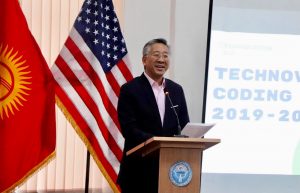Last week, President Joe Biden announced his latest batch of nominations to fill various high-level positions across in the Departments of Defense and State, which require Senate confirmation. Among the nominations announced was that of Donald Lu, the current U.S. ambassador to Kyrgyzstan, to the position of assistant secretary in the Bureau of South and Central Asian Affairs at the State Department.
If confirmed, Lu would be the first full-fledged assistant secretary of state in nearly four years for the region, which includes not just the five Central Asian states of Kazakhstan, Kyrgyzstan, Tajikistan, Turkmenistan, and Uzbekistan but Afghanistan, Bangladesh, Bhutan, India, the Maldives, Nepal, Pakistan, and Sri Lanka.
In May 2020, Alice Wells announced her retirement from the State Department. Wells had served as acting assistant secretary of state for South and Central Asia for most of the Donald Trump presidency, holding the title of principal deputy assistant secretary. That Trump never got around to nominating an assistant secretary to be officially confirmed to the position ran counter to the administration’s aim to extricate the United States from Afghanistan and larger geopolitical tides moving the U.S. closer to India. Among Wells’ accomplishments, nevertheless, was the February 2020 unveiling of a new U.S. strategy for Central Asia.
The last confirmed assistant secretary of state for South and Central Asia was Nisha Desai Biswal, an Indian American woman who had been serving as an assistant administrator for Asia at the U.S. Agency for International Development (USAID). Biswal served in the post from January 2014 until the last day of the Obama administration, January 17, 2017. Under Biswal, the C5+1 dialogue between the United States and the five Central Asian republics took form. The format remains central to U.S. strategy for the Central Asian region, which often seems to play second fiddle to the rampaging elephant in the regional room — Afghanistan — and the broader bureau’s concerns with the vastly more populous and geopolitically critical South Asian countries of India and Pakistan.
If confirmed, Lu would be the first diplomat take up the assistant secretary post with significant prior Central Asia experience. Lu, a career Foreign Service officer, has served as U.S. ambassador to Kyrgyzstan since September 2018. Immediately before his ambassador stint in Kyrgyzstan, Lu was U.S. ambassador to Albania and had previously served as deputy chief of mission in India, Azerbaijan, and Kyrgyzstan.
With the United States aiming to withdraw from Afghanistan by September 2021, Washington arguably will look to partners in both South and Central Asia for support. Experience in the region may be key in pursuing U.S. interests from farther afield.
According to a New York Times report shortly after Biden’s announcement of the withdrawal plan, U.S. officials had been in touch with Kazakh, Uzbek, and Tajik authorities about potential basing arrangements. In recent weeks, U.S. Secretary of State Antony Blinken has had phone calls with the Kazakh and Uzbek foreign ministers (no mention in the readouts of base talk, but it’s not a wild speculation to suggest such matters came up). Last week, Blinken met virtually with the C5+1 foreign ministers; naturally Afghanistan was a topic of conversation.
The last U.S. troops left Central Asia in 2014, with the closure of the U.S. transit center at Manas in Kyrgyzstan. The facility, often referred to colloquially as an “air base,” sits beside Manas International Airport outside the Kyrgyz capital and for more than a decade served as a jumping off point for personnel and equipment headed to the war in Afghanistan. The base became a flashpoint in local political battles, as well as a divisive geopolitical wedge — Kyrgyzstan also hosted (and continues to host) Russian military facilities.
The United States also, from 2001 to 2005, based forces out of a former Soviet base in Uzbekistan called Karshi-Khanabad, known as K2. After the Andijan crackdown, U.S. relations with Uzbekistan, under the rule of late President Islam Karimov, soured rapidly and Washington was kicked off the base. That may have been for the best, given reporting in late 2019 that found evidence K2 was contaminated with chemical weapons remnants, possibly contributing to cancer among the Americans who had been stationed there.
If the United States is pursuing new base possibilities in Central Asia, somewhere to perch should conditions in Afghanistan deteriorate post-withdrawal, it makes eminent sense to staff such a key diplomatic position dealing with the region with someone who knows it well. Even if the U.S. does not pursue such basing arrangements, Lu seems a wise choice. He has not been meek in his time in Kyrgyzstan as the country stumbles through a political maelstrom, making pointed comments underscoring U.S. commitments to good governance, the rule of law, anti-corruption, and the importance of civil society and media freedoms. These would seem to fit within the Biden administration’s stated diplomatic goals, though may ruffle feathers across the broader South and Central Asian region.

































